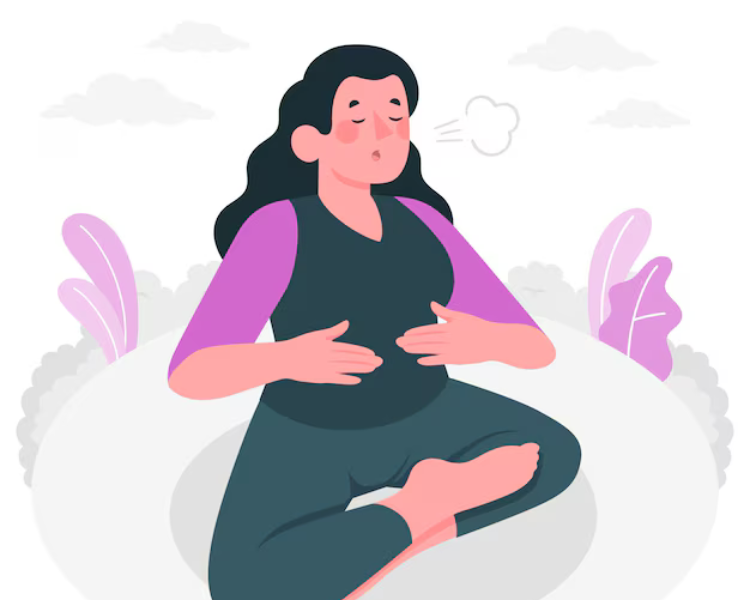The Baby Blues
The postpartum period, that is to say the period after giving birth, is a real upheaval in the lives of women. The arrival of a baby is an experience that is both exhilarating and overwhelming for young mothers.
However, after giving birth, 50 to 80% of new mothers are faced with conflicting emotions and a feeling of deep sadness, commonly called the "baby blues" and more than 15% of women will even experience an episode of postpartum depression.
Intense fatigue? Loss of motivation? Guilt? Depression? We still talk too little about these symptoms that nevertheless affect the daily lives of many mothers in the weeks and months following childbirth.
However, it is not inevitable. And when we understand the causes of this malaise, it is immediately easier to free ourselves from it and find postnatal fulfillment.

So, what are the symptoms of the baby blues and how can we differentiate it from postpartum depression? What actions can we take to avoid it ? And finally, how can we overcome it if we are faced with it ? We will explain it all to you today.
What is the Baby Blues and why is it so rarely talked about?
The arrival of a baby is a wonderful event. Expected for many months, meeting our newborn marks the beginning of a new stage in our life as a woman.
But, as wonderful as it is, this period is also accompanied by many physical, hormonal and emotional upheavals for the young mother and can bring its share of difficulties.
Intense fatigue, stress from not knowing what to do, fear, anxiety, sadness, irritability are all symptoms that can also accompany the so-called postpartum period .
This set of unstable emotions and moods that usually occur in the days following childbirth is ultimately a common reaction of the body linked to significant hormonal changes and accumulated fatigue. This is called the baby blues and it affects nearly 80% of young mothers.
Yet baby blues are often downplayed or ignored, which can make the situation worse and leave women alone to deal with their feelings.
Baby blues or postpartum depression?
Baby blues is a common reaction that affects nearly 80% of new mothers in the first weeks after giving birth, to a varying degree depending on the woman.
Fluctuating mood, frequent crying for no apparent reason, irritability, increased fatigue, emotional sensitivity, anxiety and guilt
This transitional period in a woman's life is often accompanied by a sudden drop in pregnancy hormones, which, combined with fatigue and the challenges of caring for a newborn, can cause this intense emotional reaction.
As difficult as it may be to live with, the baby blues is a transitory state lasting a few weeks (sometimes months) at the end of which the young mother regains her motivation, her energy and a less fluctuating mood.
But for 10 to 20% of mothers, this physical and hormonal upheaval can also lead to a more severe form of emotional disorder that is similar to real depression: postpartum depression. The symptoms will be much more pronounced at this time than in the case of baby blues, sometimes with an inability to move forward and succeed in taking care of one's child. This is when we can observe the real symptoms of depression.
Postpartum depression is usually linked to physiological, psychological and environmental factors. In addition to hormonal fluctuations, other factors may play a role such as personal or family history of depression, lack of adequate support, stress, relationship problems or financial difficulties.
It is essential to understand that postpartum depression is not weakness or a sign of poor motherhood, but a mental health disorder that requires proper medical attention.
In any case, the best solution for getting through the postpartum period is not to isolate yourself, but on the contrary to talk about it and stop trivializing these disorders which affect many more women than we imagine.

Because talking about it is the first step in finding suitable solutions to take care of yourself, free yourself from guilt and implement different actions to free yourself from the baby blues and experience a fulfilling motherhood.
Causes of the baby blues
Short (or even non-existent) nights, pressure to do everything perfectly, a fear of doing something wrong with this tiny being who is already so precious... The first days of motherhood are a succession of events that put our body in a state of chronic stress.
Not to mention the great loss of minerals that the body has suffered during pregnancy or the sudden drop in pregnancy hormones. The postpartum period, that is to say the period after childbirth, is a real physiological ordeal.
To combat this physical and psychological exhaustion , the body then operates in “overdrive” thanks to cortisol, the stress hormone that it produces in excess. But this “overproduction” of cortisol exhausts the body… and one of the consequences will be the fall in the production of dopamine (the hormone of motivation, well-being and pleasure).
These two hormonal disturbances explain the symptoms felt by young mothers who experience baby blues .
And the risk for some is that this “over-activity” maintained by excess cortisol stops abruptly , plunging the young mother into what is this time called post-partum depression.
But if we take the time to protect ourselves and listen to ourselves, we can overcome these challenges and fully enjoy a serene and peaceful motherhood thanks to natural solutions and tips .
How to prevent and overcome the baby blues naturally?
Prevention from pregnancy
The first step is during pregnancy !
Today, we spend many hours preparing for childbirth in our childbirth classes, and that's a good thing. But it also seems essential to take the time to talk and anticipate what happens next...
Because from pregnancy onwards, there are things to put in place which are recognised to reduce the risk of baby blues and postpartum depression.
Omega 3
Beyond allowing your baby to stock up on omega 3 for the first 3 years of life, the consumption of essential fatty acids such as omega 3 is known to prevent the baby blues and postpartum depression.
Its ability to help the brain increase the production of neurotransmitters and hormones essential for regulating mood, including serotonin, makes it a nutrient of choice for preventing or treating any type of mood disorder.
Uncooked vegetable oils every day and small oily fish 3 times a week from pregnancy and continuing in the months following childbirth will be a valuable daily help.
Physical activity
Physical activity is the ultimate wellness ally and is particularly beneficial during pregnancy. So, of course, we're not talking about setting yourself the challenge of finishing your first marathon at 8 months pregnant, but rather about maintaining a gentle , moderate physical activity that is adapted to your condition until delivery.
Walking, swimming, yoga… Moving your body and muscles is a non-drug action known to help improve your postpartum recovery capacity and reduce the risk of mood disorders by reducing fatigue and depressive or anxiety symptoms.
Rest, ask for help
One of the first steps to take to overcome the baby blues is to rest as much as possible . Fatigue often amplifies negative emotions. Don't hesitate to ask those around you for help with daily tasks and thus give yourself some well-deserved moments of rest. This psychological support can be a valuable help.
And even if it is sometimes difficult to find the time to relax, certain breathing exercises can be very beneficial, and accessible to everyone, even with a baby who does not yet sleep through the night.
This is the case of cardiac coherence, a tool recognized for reducing stress and cortisol levels for almost 5 hours.
- For 5 minutes 2 to 3 times a day
- We take 5 breaths per minute
- In practice: inhale for 5 seconds then exhale for 5 seconds

And don't hesitate to confide in your midwife who is there to support us during this key stage in a woman's life that is motherhood. Discover the testimony of Vanessa, midwife and young mother
Phytotherapy and micronutrition for young mothers
Physical, psychological and emotional exhaustion are part of the daily life of the majority of young mothers.
So to prevent and fight as best as possible against this state which prevents us from fully enjoying the first moments of our motherhood, it will be necessary to support the synthesis of cortisol and to explore natural solutions recognized to fight against chronic stress and fatigue.
This is where herbal medicine and micronutrition can become real allies, bringing us energy and vitality.
- Support cortisol synthesis to avoid overproduction which exhausts the body thanks to blackcurrant.
- Deeply remineralize with plants such as nettle (aerial part), horsetail or even oats. Thanks to their remineralizing and anti-fatigue properties, these plants help fight fatigue, stress while maintaining vitality & energy.
- Boost dopamine production by providing tyrosine, the precursor of this neurotransmitter essential to our energy, vitality and motivation.
- Provide B vitamins (B3, B6, E and A) and magnesium (300 mg per day, in the form of bisglycinate for optimal assimilation) essential for stress management and well-being.
Equilibrist to help you in your postpartum
To make your life easier, we have combined in our NO BLUES formula , Oats with tyrosine and well-being vitamins (group B) as well as magnesium.
This complete formula will help you preserve energy, vitality and well-being to fully enjoy your new life as a mother.

You are a great mom
Baby blues are a normal and temporary phenomenon that affects the daily life of many women after giving birth. It is essential to break taboos and talk about it openly to offer adequate support to new mothers. Remember that every woman is unique, so listen to yourself and adapt these tips to your own needs.
You are a great mom, and you deserve to be supported and surrounded during this wonderful but sometimes difficult stage of life. So give yourself time, take care of yourself and allow yourself to fully enjoy this beautiful adventure that is motherhood.




